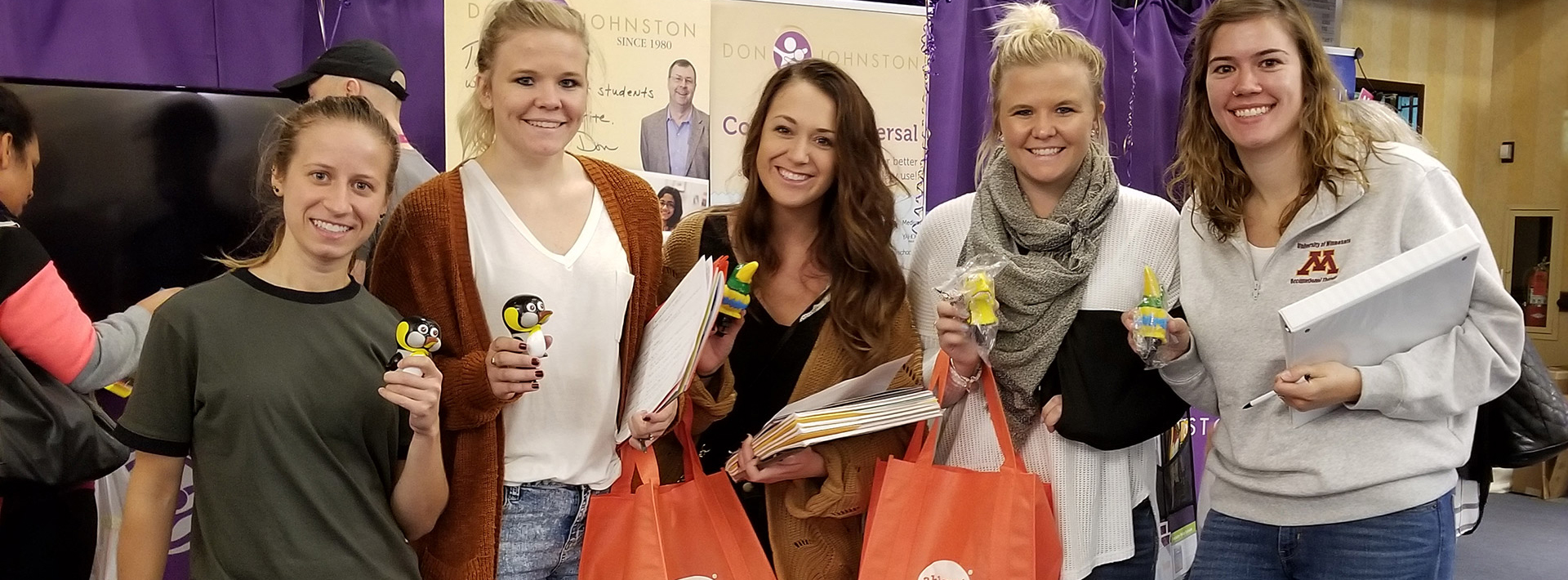Moved? Changed your name? New job? Different email address? Let us know so we can keep you informed about events, news and updates that matter to you.
As departments within the University of Minnesota College of Pharmacy, we are incredibly grateful for the many ways our alumni engage with our community to support students and advance the science and professions of Medical Laboratory Science, Occupational Therapy, and Pharmacy.
View the Celebrating our Alumni page to see highlights from some of our alumni.
Rebeca Chery Mask, Class of 2012
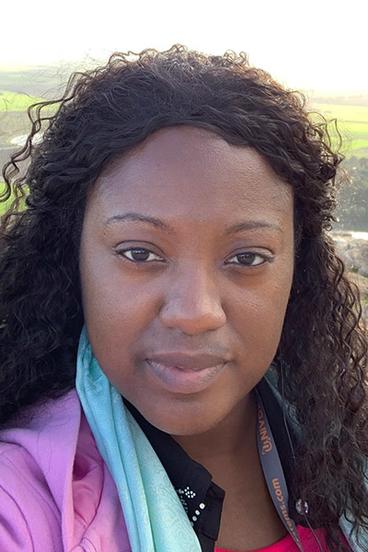
Rebeca Chery Mask is an admirable occupational therapist (OT) who is profoundly connected to her family, faith, and profession. She has Haitian African heritage from both parents, and gained American heritage from being the first generation born in the United States. Rebeca was born in New York, raised in South Florida, and now resides and works in Arizona as an OT.
In 2006, she began her undergraduate education at the University of West Florida. With a passion for the health sciences, Rebeca initially aspired to become a doctor. While navigating this interest, she decided to pursue nursing school. She then earned the opportunity to engage in a selective internship program at Mayo Clinic, in which only 150 students from across the U.S. were admitted. Although this was a great learning experience, she ultimately decided nursing was not the profession she wanted to build her career in. She then decided to complete her undergraduate career with a Bachelor’s of Health Science, and graduated in 2010.
Knowing her ultimate goal was to continue her education in the healthcare field, Rebeca applied to a Master’s of Healthcare Administration (MHA) at her alma mater University of West Florida in Pensacola, Florida and the Master’s of Occupational Therapy at the University of Minnesota - Rochester. While waiting to hear from the OT program, she was accepted into the MHA program and began coursework. Shortly after, she was accepted into the OT program, which immediately changed her trajectory. Ultimately, she had the goal of becoming a healthcare practitioner, and knew this OT program would allow her to fulfill these aspirations. Rebeca graduated with her Master’s of Occupational Therapy in 2012. She later was accepted and was granted admission as a Doctoral candidate in the Occupational Therapy program at Bay Path University in 2019.
Rebeca positively remarks on her experience at the University of Minnesota. She enjoyed and appreciated not only the courses she took, but also the style in which they were delivered. The coursework was rigorous and practical, allowing her to be well prepared for her future positions in the field. Furthermore, she felt very connected to the campus and greater Rochester community. There were multiple community organizations she became involved with, which brought great synergy into her life. One of her many noteworthy community engagements was her work with AmeriCorps, where she worked with school children, and later, the local community. Through the university, she established relationships with alumni, providing mentorship. In fostering these relationships, Rebeca met Jenny Hegland, the Community Engagement & Relationship Manager at UMR and initiator of the Students in Service program with AmeriCorps from 2010-2012. Rebeca worked at UMR to support SIS that inspired other undergraduate & graduate students to become involved in community service within an underserved population group. Jenny later nominated Rebeca for the Chancellor’s Award for Public Engagement and Student Leadership, which she received for her student leadership and pivotal work in the community.
Rebeca’s graduate school experience at UMR was enhanced and impactful due to the diversity of students in the program. Rebeca recounted that her classmates came from many different educational backgrounds, which was an asset to the learning experience. Students were able to collaborate and learn from each other, and many felt strengthened by this. “You really can come into the program from different educational backgrounds and make a strong transition to OT.”, states Rebeca. Additionally, her classmates came from different racial and ethnic identifications, which she drew connection and belonging through. The relationships built through the program helped her grow professionally and personally. Rebeca felt that the community and classmates cared about one another. It is because of this, she encourages future students to make connections, embrace mentorship, and take advantage of available resources; it positively impacts this educational experience.
Rebeca has deep admiration for the field of occupational therapy. While she respects the traditional medical model, occupational therapy allows her to treat patients with holistic methods allowing more input from patients. She remarks, “That’s one thing I love about occupational therapy; the patient can guide their own treatment, tell you about themselves, and let you know what they are open to.” Rebeca has felt strong career satisfaction due to these aspects, especially because it aligns so closely with her beliefs and goals.
Over her career, she has held multiple positions in acute care hospitals, in/outpatient rehabilitation, skilled nursing facilities, and home health. She currently works for Bayada Home Health in Arizona. As much as she enjoys her current position, she is looking to continue her professional development, and will begin working in the school setting this upcoming school year (2022-2023). She has always had a passion for working with children, and it is important for her to continue growing and following her interests. With well-rounded experience, her advice to future students is to never stop exploring your interests. The occupational therapy field is so broad, and professionals have many options and paths to explore.
Being an outstanding professional and alumni with an impeccable resume, Rebeca has decided to donate to the University of Minnesota Occupational Therapy program. While completing her degree, she earned a scholarship to assist with tuition payments, and now is giving back, providing future students the same opportunity. She explains, “Occupational therapy encompasses everything I believe in, and is part of my legacy. Occupational therapy is one of the best investments, not only for the patient, but for the community as a whole.” Especially with the recent accreditation of the Doctoral Occupational Therapy program at the University of Minnesota in 2020, Rebeca is enthusiastic about her partnership with the university, and the impact she will have on future students. To further give back to the OT program, Rebeca has recently joined the university-wide mentorship platform, the Maroon and Gold network, to mentor and coach students as they navigate their career journey.
Susan Becker, Class of 1969
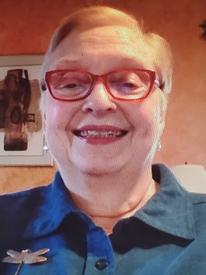
“Occupational therapy is hard to explain to people,” says Susan Becker, University of Minnesota OT graduate from the class of 1969. “I remember a joke I heard about this: ‘Physical therapy will get you ready to run a marathon and occupational therapy will make sure you have your pants on.’”
It turns out the endurance of Becker’s own OT expertise spanned more than a marathon, when she found herself applying her skills earlier this year, 50 years after she graduated from the “U”, to help someone who’s very close to her.
That person was herself.
Following complicated back surgery, Becker says she developed an infection that required more surgery, and she sustained cracked vertebrae during her transport to and from a nursing facility. The ordeal left her temporarily unable to walk, and in a rehabilitation facility. “The occupational therapists had equipment and I showed them how to do it,” she says. “I was surprised how many of the muscle names and nerves I remembered and the terminology. I must have learned it really well because it came to me 50 years later.”
When she left rehab and returned to her Chicago area home last April, she conditioned her arms to accommodate a walker, and her mobility has improved in the time since.
Becker’s ongoing passion for OT and its role in helping improve peoples’ lives began during her research for a report on the topic in 9th grade. This solidified her determination to study the field. “I thought that sounds really cool,” she said of the profession.
When she later enrolled in the University of Minnesota, her early studies focused on Classical Greek, before she entered the OT program. Now, like then, OT students approach the program with a wide variety of academic backgrounds.
And now, like then, OT graduates also apply their expertise within numerous different settings. Susan Becker chose the intersection of psychology and occupational therapy, working within several Chicago-area hospitals to help psychiatric patients with their daily living skills. Her career also involved teaching and consulting nursing homes.
Year after year, Becker chose to donate to the University of Minnesota’s Occupational Therapy Program, to “support children, whether it’s for books or some special thing they need to do.” She has also committed to support an education that continues, to this day, to remain relevant to her own life, and has no plans to stop.
“They’re in my will. I think I’ve been very blessed to have had the education I got and to do the things I’ve wanted to do in terms of working with populations. Its important to support the people who’ve supported you.”
Sally Kamps (Irons), Class of 1956
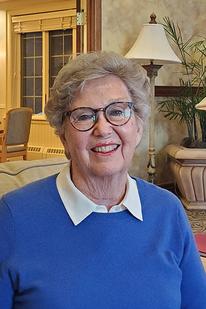
Sally Kamps, a University of Minnesota Occupational Therapy (OT) graduate (class of 1956), attributes two life events to her ongoing work helping people overcome challenges: the experience she gained in the University’s OT program, and the struggles her childhood best friend endured, living with cerebral palsy.
“I used to go to the original Curative Workshop with her for treatments and observed occupational therapy in action and that had a lasting impression on me and influenced my decision about a career choice,” she says.
Sally devoted the earliest part of her occupational therapy career working with psychiatry patients at University Hospital, and then with people recovering from strokes at Methodist Hospital, where she worked closely with a speech therapist. The two started a group called The Communications Center, for stroke patients and their families to better understand the changes in their lives and how to deal with them.
Sally’s retirement from Methodist and the OT profession in 1982, marked, in some ways, an escalation of the kind of thinking she brought to the Communication Center; connecting people who have special needs with services to help them thrive.
She and a minister at Colonial Church started a program called Tapestry which brought special needs and typical high school kids together to promote acceptance, understanding, and inclusion through fun activities. Later, after her husband's death in 2003, Sally was searching for meaning in her life. And again, she partnered with the minister and his wife, who were starting a group for high school special needs kids called Young Life Capernaum. Sally volunteered over the years and still remains on the Board.
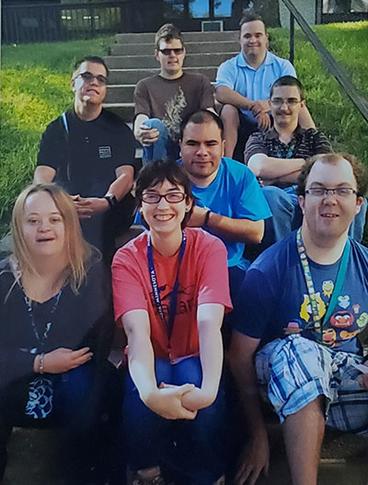
“When those kids graduated from high school, we could see a need for something more, so we started Beyond Limits, a two-year college program for high functioning special needs kids, to provide a college experience that promotes inclusion, learning life skills, and becoming independent,” she says.. “It’s a wonderful residential program held at Bethany Global University.” Sally still serves on the board of directors and is interested in exploring continued opportunities for the students to maintain independence in group living after they graduate. .
Sally cites the enduring ability of occupation therapy to make a difference in helping peoples’ lives through problem solving. The impact of her childhood friend inspired this decades long commitment, and Sally credits the training she received at the University of Minnesota’s OT program with providing the broad thinking and strategic foundation to sustain it.
Sally’s decades-long devotion to helping people isn’t limited to her volunteer work. For more than 30 years she’s also donated to the University of Minnesota’s Occupational Therapy program. “I hope it would help some students that would need it,” she says. “I’m big on scholarships and I just think it’s important for that program to continue. It’s such an important thing and that’s why I continue to support it.”
Bill Pedersen, Class of 1964
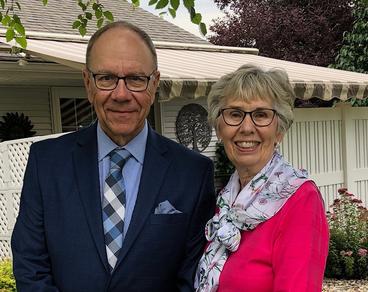
56 years separate today from the day Bill Pedersen graduated from the University of Minnesota’s Occupational Therapy program, a time when a full year’s tuition cost in the low hundreds of dollars.
In the five decades to follow, Bill’s OT training carried his career to the Hastings State Hospital, North Memorial Hospital(where he established its OT program), the Connecticut Mental Health Center, Yale University (where he graduated with a Master’s of Public Health), a psychiatry lecturer role at Yale, an assistant administrator at the Connecticut Mental Health Center, the administrator of a mental health program in Grand Rapids, MN, and the CEO at the St Peter Regional Treatment Center (then the largest public treatment facility in Minnesota devoted to forensic, mentally Ill and developmentally disabled patients).
The University of Minnesota’s Occupational Therapy program has always been a gateway for graduates to contribute to the well-being of others through many different paths. Some of its OT graduates devote their entire career to working directly with patients. Some transition to other health care disciplines. Some, like Bill Pederson, build upon both their OT education, and their meaningful engagement with patients, to lead an organization.
“I truly believe my clinical experience as an OT was a major asset in my future career,” he says. “The experience in the OT program at the University of Minnesota was the foundation for all that was to come.”
Retired, now, for nearly 20 years, Bill still views the study of occupational therapy as, most fundamentally, an essential discipline that teaches students to help others perform the day to day functions that are critical toward living their best lives. But access to this education has diminished since his day as a student, as costs to enroll have steadily risen.
The University of Minnesota’s OT program makes scholarships available to students to help offset their tuition and housing costs. Behind these and other financial resources is an alumnus like Bill Pederson, who donates regularly. He’s dedicated to helping students who are committed to practicing the field receive the outstanding education and overall experience that the program provides.
“I couldn’t say enough about contributing. Every little bit helps. Every little bit the department gets, they use. There are no bells or whistles,” he says. “We need to step up. These things won’t happen unless we do. There needs to be more than words.”
These many years after Bill graduated from the University of Minnesota and reached the height of his career, he feels a strong affinity for those who are just entering the program. “I still consider myself an OT,” he says. “I want to help in any little way I can.”
Julie Thomas, Class of 1974
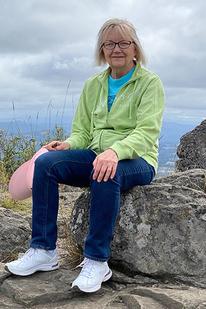
The University of Minnesota’s Occupational Therapy (OT) Program is a field of study whose students can enter from virtually any academic background.
“We were a small cohort in a large institution,” says Julie Thomas, who graduated from the OT program in 1974. “We would have lectures from people from all over the university as a whole. [They] were actively engaged in research. They were in the headlines for the work that was being done for the university. We were right on the cutting edge of that.”
Such resources contribute, Julie says, to the limitless opportunities that await the program’s students after they graduate.
“It really is as varied as your imagination. Whatever interest you have you’ll be able to find a way to use your occupational therapy skills,” she says. “If you get tired of working with little kids you can start working with older people. It is so varied that I felt I was never bored. I never lacked for challenges and I think that’s the stuff that makes a fantastic career.”
Julie’s father was in the Navy and knowing of its need for occupational therapists to assist with soldiers deployed at that time in Viet Nam, she enrolled in a Navy program during the third year of her UMN OT studies, to help.
That kicked off a career that coupled her personal passions with the expertise she attained from her studies with UMN’s OT program. In a sentence, she: provided OT within patients’ homes; within a Naval medical center; led the medical center’s OT program; served on the staff of a hospital; and transitioned to teaching or leading the OT programs in a medical college, a technical college, the University of Minnesota, and the University of Toledo.
Along the way she authored/co-authored 28 articles on the application of occupational therapy, attained numerous grants to support her work, led dozens of peer reviewed presentations, and won multiple awards for her exemplary teaching, research and therapeutic excellence, including Therapist of the Year from the Minnesota Occupational Therapy Association.
“I think the older you are the more you appreciate the things that got you to your success in life. I certainly think about the beginnings I got at the University of Minnesota OT program,” she says.
For more than 35 years, Julie has chosen to donate to the OT program. Having received an income from her early days with the Navy, she emerged from the program in strong financial shape. But as a former OT student, professor, and administrator, she’s well aware of the wide gaps that donations to the program fill.
“Students are scraping by and the costs of education continue to go up,” she says. “There’s a need for assistance with many aspects of a program, and I think once you’ve achieved a great deal, once you’ve used your knowledge and skills, at least I feel as though whatever I’m able to do I try to think of the University because of all it’s given me in preparing me for my lifelong career.”
